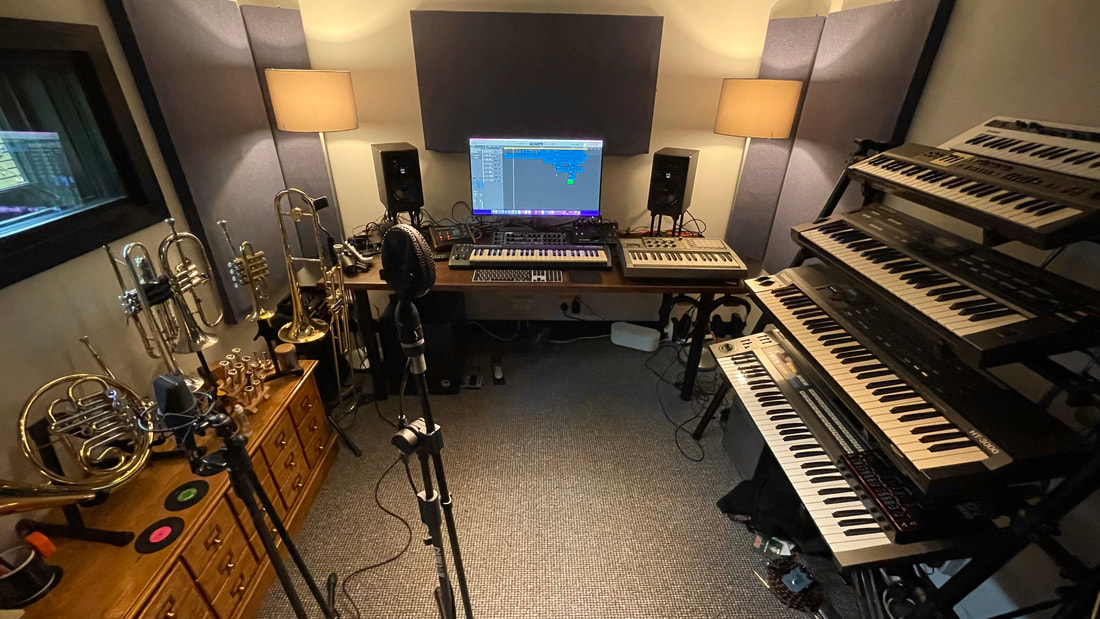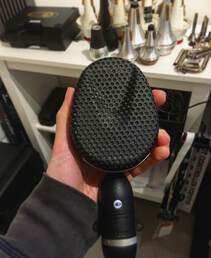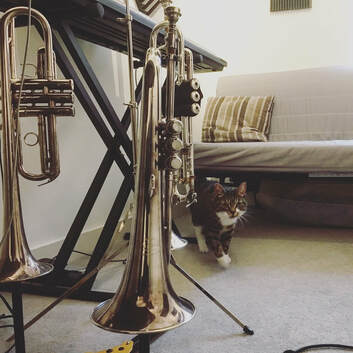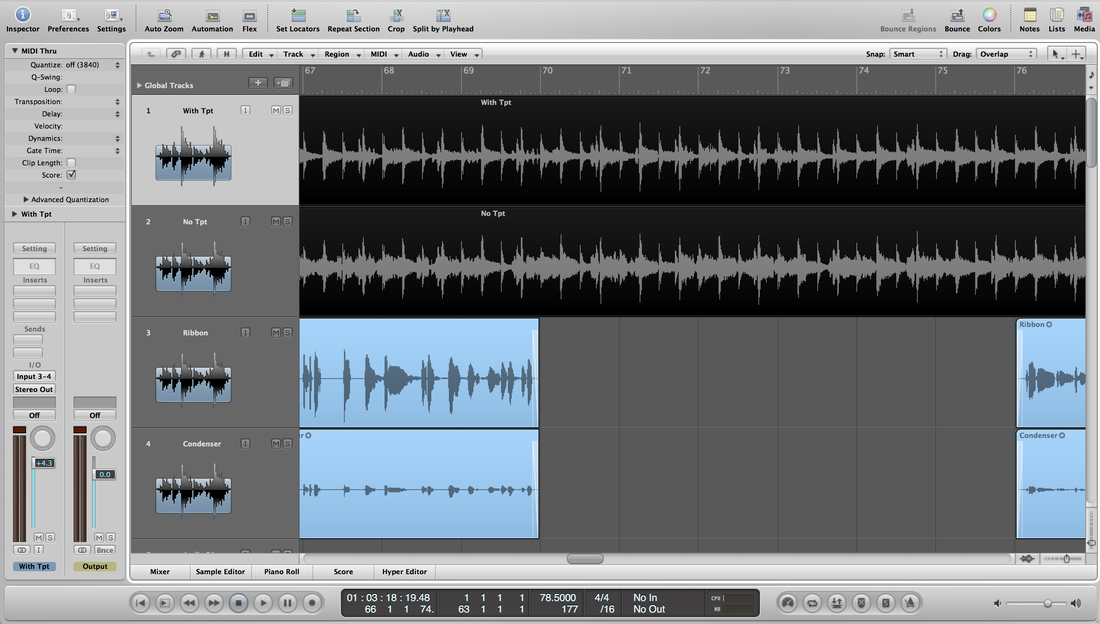|
Tips for the professional musician on setting up and using your own studio to work 'remotely' or 'online' FIRSTLY apologies if you find any of this obvious or lengthy. I decided to just write down what I've experienced & learnt whilst recording for people from my own studio for a number of years (known as 'remote sessions', 'online sessions', 'e-sessions', etc). A lot of it is just the same sort of stuff that applies to every other facet of being a professional musician. As I'm a trumpet player and brass arranger, I strongly recommend also visiting Pete's website for some really fantastic articles regarding recording, arranging and more 'string-specific' advice and examples. CONTENTS || YOU || your playing, flexibility, variety of work, niches || GEAR || mics, interfaces, computers, monitoring, software || ROOM || acoustics, noise, neighbours || RECORDING || studio, materials, recording to midi, attitude || DELIVERY || editing, bouncing || WORKING WITH CLIENTS || getting work, keeping work, variety of clients, websites, social media, contracts, fees, valuing your services || FINAL THOUGHTS || insights into the working processes and practices of working from your own studio, by Pete Whitfield YOU: You’ll need to have an element of musicality & personality in your playing. Most often, you’ll be replacing midi instruments or samples. Luckily for us, at best these still sound like a pale and robotic imitation of a real player. At worst they sound truly awful (no offence to the people who make them – they have their place and their uses!). Your primary selling point as a session player is the humanity & emotion in your playing and your sound. That said – if you’re doing a few ‘pads’ on a library music track don’t go too nuts with the ‘espressivo vibrato’ unless indicated! You’ll need to be able to play and be well versed in a mix of styles. You never know who will call, and what they’ll ask you to play. You’ll want to be able to take each job rather than turning work down because, for example, you see yourself purely as an orchestral player and couldn’t ever imagine imitating a bit of dixieland, razzing out horn lines on a rock track or working your vibrato to the limits on a bit of mariachi! Many people who’ll be asking for your services will be writing in a wide variety of styles themselves. They’ll expect a certain amount of adaptability from a session player to be able to deliver in whatever is the style is required. I find it incredibly enjoyable to have variety (in fact if I’m honest, I couldn’t do without it!), and that works to my advantage. BUT – a word of caution! Don’t stretch yourself too thin. For example, I personally would recommend someone else if a producer or composer asked for a track full of “Maynard Ferguson-esque” ‘super C’s’ or if someone asked for an insane bebop solo. It is important to recognize what you’re good at, and what you aren’t so confident at. Hopefully this is obvious stuff! Having said all that, if you are particularly strong and well established in one aspect of playing, it CAN be great to use that as a niche. You could be THE go to person everyone uses who wants a bit of zadar sea organ on their track (yes ok, I googled ‘obscure instruments’). It will be a HUGE help if you are good at quickly learning by ear as you listen to tracks. A LOT of the work I do is replacing midi trumpet (hopefully in a more nuanced & musical way!) that someone has sent without sheet music. Particularly TV or pop work with quick turnarounds. And a LOT of people you’ll record for – many pop producers, indie bands, singer-songwriters for example – won’t even read music, let alone provide written out sheet music. You’ll be recording using a guide track. I’ve even recorded along to a guide track of someone SINGING what they want on trumpet (which was similar to being sung at through the glass via talkback in a studio). If you can have something down by ear almost immediately and are able to do an entire session without writing anything out then you have an advantage, as it will save you hours of time. The skill of being able to hear music in real time and copy it rapidly can make sessions where there is a huge work load MUCH less of a nightmare.
Dynamic mics pick up hardly any of the ‘room’ sound. Learn and research how to use your mics properly, and how to play into them. I’m perhaps speaking more about recording trumpet / brass with the advice in the last few sentences, so just ask advice from whoever plays / records your instrument. Next, a decent audio interface with a number of mic inputs. I always record with a number of microphones, and often blend them to get great results. Every mic I have picks up slightly different aspects of my sound, so recording into a bunch of them at any one time means I have great flexibility on how the final stem will sound. There are plenty of great interfaces out there – you can even get superb results from affordable ones that plug straight into a laptop via usb. Speaking of plugging into a laptop – whether it’s a macbook, desktop or PC you’re going to need a high spec computer with LOTS of memory and storage (you’re hopefully going to need it). It’s amazing how fast it runs out, and how recording high quality audio can slow up your machine. And BACK UP. I do this by using an Apple Time Capsule over wifi. However you do it, DO IT. Back up back up back up back up BACK UP! Since I mentioned wifi, you’re going to need a FAST connection. I had an average/poor one for a few years and it wasn’t great for my sanity when I was sitting there with wetransfer.com telling me it’ll take 45 minutes to send one stem to a client. Not great for sanity, and also not great if you have to turn in something last minute. That also goes for downloading material that clients send to you. Next up, a half decent set of studio monitor speakers, some top of the range ‘closed’ monitor headphones to use whilst recording and also some really decent headphones for simply listening closely to what you’ve recorded. I’d recommend setting aside a space where you have everything set up and ready to go. This can be a corner of a room if you’re starting, or more preferably an actual studio room (that’s me). Or if you’re really lucky, a full blown custom built studio at the bottom of your garden (I wish that was me!). Software? Logic or Pro Tools. Its all everyone uses. I went the way of Logic. I do have Ableton, but rarely use it – that’s more useful for gigs. ROOM: If you’re lucky, your room has a great acoustic to start with. But if not, acoustically treat it. Deaden it using acoustic foam padding or wooden diffusers to get rid of any nasty ringing, ‘tinny’ reverb or overly exaggerated ‘lows’. When deadened, you don’t want it to sound dull or ‘boxy’. Brass players - don’t play into hard, reflective surfaces! Most people want you to deliver your stems ‘dead’ acoustically, so in their own mixing process they can acoustically treat your playing themselves using plug-ins. You don’t want your room to have ANY intrusive acoustic characteristics that a composer / producer / mixing engineer can’t navigate their way around. Just think – nobody would put up with that in a recording studio. Your room IS a recording studio. If you’re lucky (sorry – third time I’ve written that!), you’ll have enough dosh – and a big enough room, and no landlord – to properly soundproof your room. I’m talking building a ‘room within a room’. I’m lucky that my studio room is cut off from all my neighbours just by luck of the layout of the building. I’m also fortunate (see how I cleverly avoided the third ‘lucky’ of this paragraph there) in that my place is relatively newly built so has thick walls – plus the window is narrow, triple glazed & looks out onto a quiet outside communal garden area so I have zero outside noise interference. Plus the added bonus that neighbours can’t hear me (when I first moved in, I actually did a little noise test with a willing neighbour where I played louder than I’d ever need to in my studio room for 20 seconds – the feedback was “I can sort of hear it, but its not annoying”… result!). This wasn’t always the case of course. When I started recording years ago in my old place, people could hear me down the street. I once went onto the social media page of a local bar to check it out and see if it was worth a visit only to find that the owner had written a hilariously sarcastic post notifying people of the “excellent news” that “that bloody trumpet has started up again!”. I also had some very nice neighbours. I once received a message from a neighbour whilst recording and was pleasantly surprised to find that, although I was expecting my first complaint, the text was actually a request for the opening of Star Wars! If you’re just starting out and recording in a living room / bedroom, most of the time when recording trumpet right into a mic you’ll find that not much can compete with it. But I did occasionally find myself having to pause for a loud moped passing by. So be INCREDIBLY careful & diligent when listening back to your recordings. Isolate them; listen for the slightest noise in the background etc. Which leads me nicely onto…
When recording, start off by listening to the midi (in order to learn it), but as soon as possible, MUTE THOSE NASTY SOUNDS and concentrate on performing musically as you would if the rest of the musicians were with you in the room! Make sure there is plenty of ‘headroom’ in the volume of your recordings. Be aware of any clipping or distortion. Lastly, you might want to make sure you know what sample rate the composer wants you to record in, or what they are working in themselves. DELIVERY: Minimal editing wins! If something goes wrong, do as much of a retake as possible. Don’t faff about with fiddly bits of chopping or editing. Sure, sometimes for an ultra tight horn stab, you do have the luxury of being able to line it up a tiny bit better. But don’t go down the road of chopping up every note, aligning everything with robotic precision – it actually sounds really, really terrible. Just play well and in time! Don’t get dragged into trying to emulate the midi you’ve been sent to an exact degree – tonally, or rhythmically.
Chop out long periods where you don’t play. Clear up around the edges of takes. Get rid of noisy breath sounds, loud valve noises, warm up notes / noises – whatever it is! Chop off and place a fader soon after the last note of a take or a phrase. Clients will appreciate this. I can’t imagine there are many more annoying things having dropped a freshly delivered recording into your project than having to faff about locating extraneous noises. If you are recording properly and have mics at the correct level, you shouldn’t have any background noise anyway. And that’s the goal, because this kind of tidying up is inSANEly dull! I consider it very much part of the service that perfectly clean & ready to use right away stems are delivered. And on that note, always send the stem so that it lines up with the start of the track you’re recording to (the track that the client has sent you). This way clients can simply drop your stem in at the start of their project and all your playing will line up perfectly. This will be hugely appreciated by clients and, to be honest, is probably expected. This goes hand in hand with my last point – leave the client with nothing left to do after dropping in your stems other than listening to how great they sound & emailing their thanks to you right away! If you’re recording multiple lines, bounce everything separately. Send everything dry, with none of your own acoustic effects or plug-ins affecting the track. Establish with the client if they’d prefer WAV / AIFF etc. WORKING WITH CLIENTS: First of all, how do you even get clients? I must just say that despite using the word ‘clients’ throughout this article, I don’t actually like that word myself. I just couldn’t think of a substitute! They are simply like-minded people who you may be fortunate to enjoy getting along with & maybe working alongside. My first tip is to get yourself ONLINE! It is ONLINE sessions that you are doing after all! You need to have a regularly maintained & professional looking website that displays your portfolio to date. Thinking about it from the point of view of a composer / artist / producer, I can totally appreciate that it does take a great deal of trust for a person to employ a remote session musician for the first time. So you need to present yourself truthfully, provide evidence to back up what you say you have done, and demonstrate that you are more than competent at playing & recording your instrument. Avoid “jazzing” up your ‘C.V.’, and don’t use adjectives unless they’re publicly available quotes or reviews. Nothing comes across more cringing or transparent than reading self-written superlatives in a long-winded (or even a brief) biography. And this should go without saying - have a specific section on your studio & remote session work. Choose the BEST SOUNDING and most relevant examples that you have, whether they are ‘high profile’ or not. Social media! If this is your thing, don’t just mindlessly follow a bunch of people you hope to work with on social media and bombard them with tweets. Don’t DM people you don’t know with corporate-style ads proclaiming how excellent you are. Don’t be tempted to let your social media presence be merely a boring list of how great your career is. INTERACT! Be yourself. Be good-humoured. Feel free to ask for opinions or advice! Be positive about and post about what other people are doing! The people you work with 'online' will end up being 'online acquaintances'. Sometimes you’ll end up meeting and working with them in ‘real life’. And sometimes they’ll even become good friends! It goes without saying to never do a rushed job. The people who you record for will use you regularly if you do a good job. And they’ll tell others about you. You'll also want to be ready to go and in good shape for when the next person calls. Don’t be rude or seem ‘huffy’ or condescending about what they’re asking you to do, their comments on your playing, or with any of their briefs or references. Treat all music with the same amount of respect. Don’t be a snob! Every style, genre and strand of the music industry has its place, its specialists and its geniuses. You will most likely get a HUGE variety of people asking you to record - from a random music hobbyist looking to make his track in he's producing in his bedroom sound extra cool, to an established TV composer or record producer. Treat them all the same! Treat each job as important as any other. They all pay! Sometimes the most random, small-scale projects that barely see the light of day can actually be the most fun to work on. Don’t assume this won’t be the case. Contracts! If it is someone you don’t know well, send them a contract to sign with ALL details for the expected session (dates, what is to be recorded, when it will be delivered, AGREED FEE). Also, never send full finished product (individual finished stems) until you have first sent a rough mix of all that you’ve recorded along with the track (i.e. unusable, but proof that you have recorded) for the client to approve and then pay you for. FEES! Don’t undercut expected recording rates that are out there. For example: MU minimums (although I happen to believe these aren’t at all great). Unless it’s for a friend’s independent project that you’re helping out with (for example), my advice would be: do not undercut or charge poor rates! I have my regular fair share of people that never reply back once I’ve quoted a fee for them. They were no doubt expecting me to do a session for 50 quid or whatever. Remember that you are providing professional & sometimes irreplaceable services: • Complete convenience • Immediate / last minute turnaround • I can often work quicker at home than I would do if I were at a studio recording session • No studio hire or staff costs, no hassle of organising and booking specific times for musicians • Clients can be getting on with other work whilst you record for them & then it just arrives into their inbox and onto their track at the click of a few buttons! FINAL THOUGHTS by Pete Whitfield: Beyond the practicalities of playing and recording, doing remote sessions from your own studio changes working process and practice. We take on new roles (notably recording engineer) and almost everything that formed the basis of the traditional session goes out the window. No more travel, no need for defined start and end times (if you’re working alone). So we can’t rely on two linchpins of the traditional session (set time and fee) to dictate our working practice. How we do our work and how we charge for it becomes a personal thing. Particularly with regular clients, it feels unreasonable to say the session fee is a minimum of 3 hours, when there may only be an hour’s recording to do. And as we are no longer in the same room, working together, there needs to be scope for dialogue, for to and fro. Remote sessions offer us flexibility, a bonus to pass on to the client. And ‘working together’ takes on an entirely new human dynamic with remote sessions. Gone is the vibe and interaction of being in the same room, working as a team and all the support, encouragement, feedback and buzz that go with it. It’s hard work, for sure, but try to replicate those things. I like reference tracks and copious notes. Do more than one take for your clients to listen to - alternate versions with slightly different phrasing / vibrato etc, be willing to rerecord brief bits. Each one of us has a different skill set and a unique way of working (thankfully). The more skills we have in our set, the more work opportunities we’ll find. For me, score preparation (from midi and audio) arranging and composing keep me in work. With your own recording facility you can fully exploit your own musicianship and take on hugely varied work. -- Please feel free to leave a comment below if you have any questions, anything else to add, or if you found this at all helpful. Good luck, enjoy and all the best!
2 Comments
|
AuthorSam is a trumpet & flugel player, composer & arranger based in London. Since graduating from the Royal College of Music he has led a varied career spanning most genres of music. Whether its playing, recording, writing / arranging brass or composing, Sam is passionate about making music. His work has seen him play the major venues & festivals across Europe, perform / record with a large array of top artists & ensembles and write / arrange / record for a number of TV shows. |




